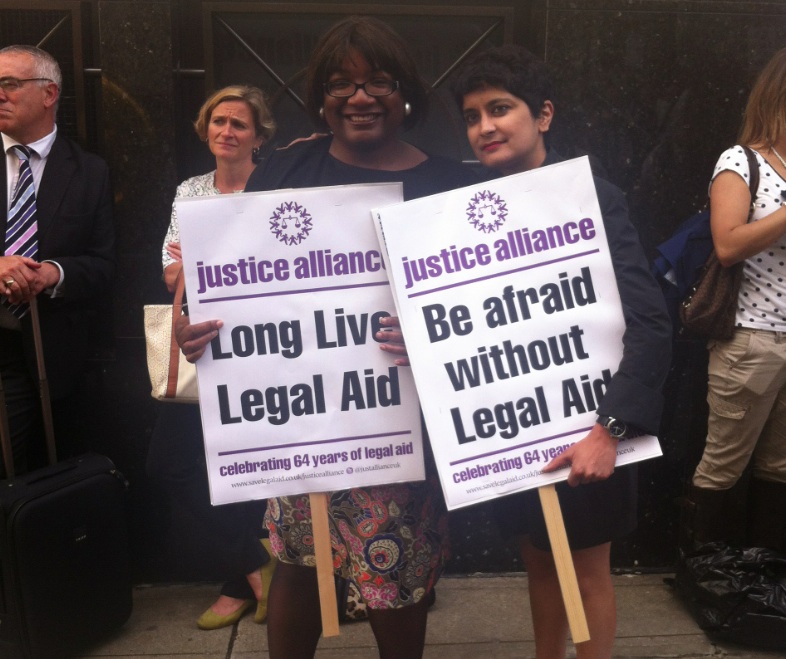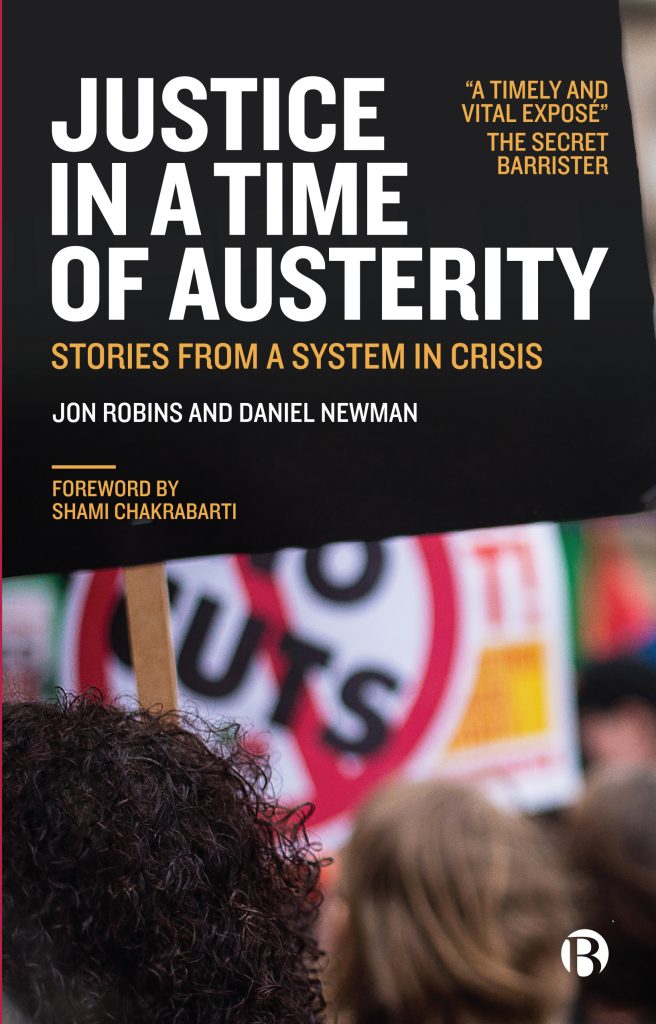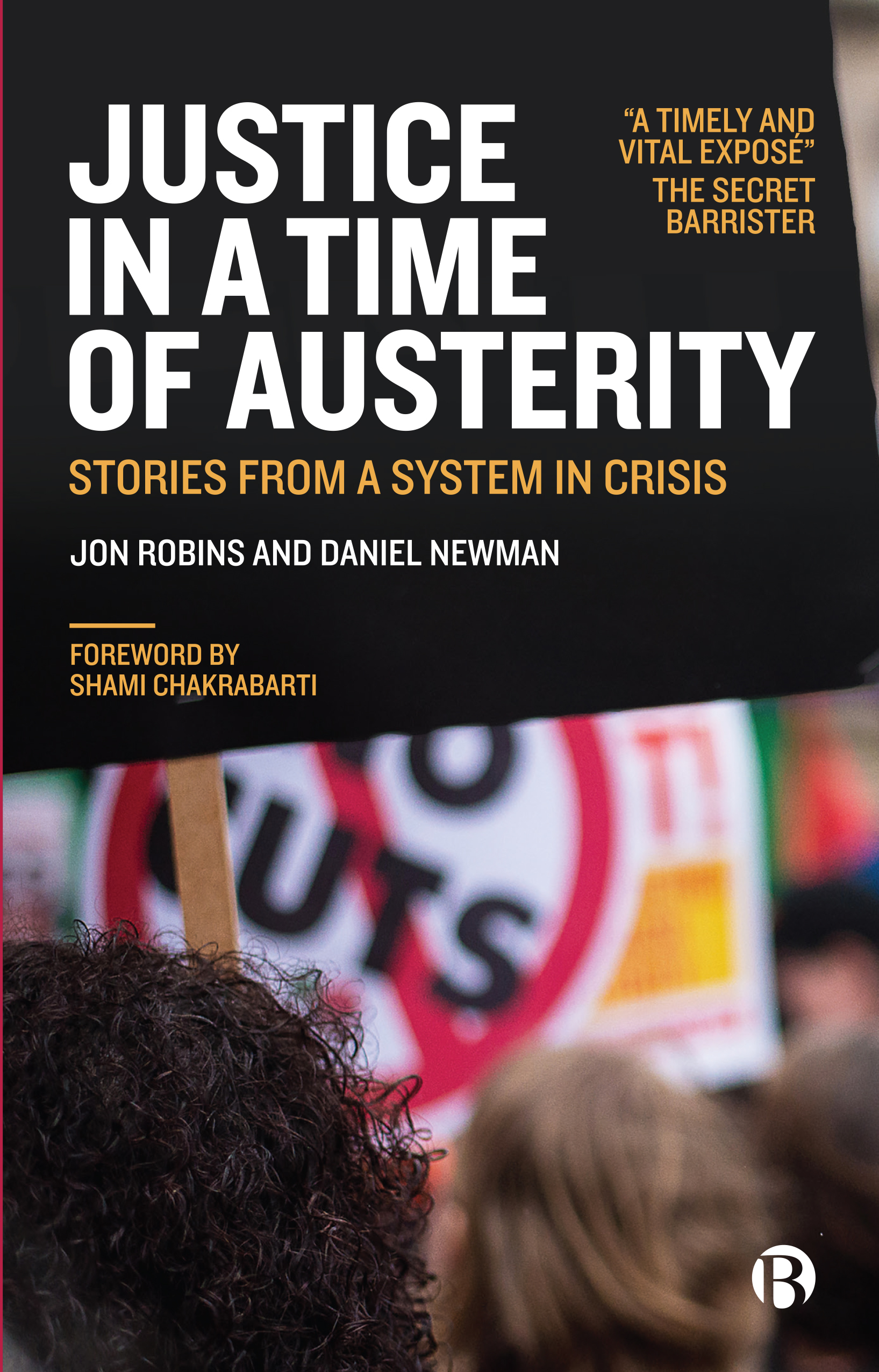A new book about ‘a year in the life of a failing justice system’ looks at the impact of austerity and the 2013 legal aid cuts on people forced to navigate our courts without help.The authors Jon Robins and Dan Newman argue that ‘poverty and social inequality are entrenched through a failing justice system’ and that the denial of ‘access to justice’ all too often represents a catastrophic step in the life of that person and their family.See below for Baroness Shami Chakrabarti’s introduction.
The cuts under the Legal Aid, Sentencing and Punishment of Offenders Act 2012, or LASPO represented biggest attack on our system of publicly funded legal advice largely removing social welfare law advice from legal aid and devastating an already struggling legal advice sector.
Over a 12-month period, starting October 2018, the pair interviewed people across England and Wales about their experiences of the justice system. Many of the people they spoke to had never seen a lawyer, let alone received legal aid. Interviews were conducted in foodbanks, homeless shelters, court waiting rooms and advice agencies in Bolton, Liverpool, Birmingham, Ipswich, Brighton, Wrexham, Cardiff, Ebbw Vale and London between October 2018 and October 2019.
-
Join co-authors Jon Robins and Dan Newman at the launch of Justice in a time of austerity: stories from a broken justice system (Bristol University Press) on Thursday June 24 and purchase the book at a 30% discount. The launch is hosted by the Legal Aid Practitioners Group.
-
Speakers include Baroness Shami Chakrabarti, Lord Willy Bach as well as contributions from guest speakers – those working on the frontline who the authors met on their journey through the justice system:
* Dan Carden, MP for Walton, Liverpool and Valerie Beach, case worker in Dan’s constituency office
* Simon Mullings, a housing law specialist from Edwards Duthie Shamish Audrey
* Audrey Ludwig, director of Suffolk Law Centre
* Richard Wilkinson, director of Bolton CAB and Gail Lyle, immigration services manager at Bolton CAB
* Warren Palmer, director at Speakeasy Advice Centre, Cardiff
* Hilary Brown, immigration lawyer and founder of the Virgo Consultancy -
Read about the launch of the project in September 2018 (here) and read about it in the Guardian and on Byline.
-
The Justice in a Time of Austerity project was a collaboration between Justice Gap editor and lecturer in law and criminology at Sheffield Hallam University Jon Robins and Dr Daniel Newman, a senior law lecturer at Cardiff University. The project was supported by the City law firm Ashurst and Garden Court Chambers through their special fund.
‘A call to arms’: From Shami Chakrabarti’s introduction

Shami Chakrabarti at a Justice Alliance demo – with Diane Abbott
It was a morning in the High Court. I was a pupil barrister sitting 16 with a treasury solicitor behind a junior member of chambers 17 responding to an ’immigration list’ of applications for permission for judicial review.
The room was grand and forbidding with its old wood-panelling and strict protocol, worthy of any cinematic depiction of British justice. It was a day like so many others during my training.
Still, someone stood out. A young woman (I think originally from Uganda) had an application in the list and her solicitor was late. I read her papers which, amongst other things, asserted multiple incidents of torture and rape before her escape to the UK.
Her case was called early on, but as no representative emerged, the court obliged by putting her to the end of the list. When the other matters had all been heard, the woman referred to as ‘Ms T’ was asked to come forward to the innermost bar, in front even of where the QCs sit, to ‘make your application for permission for judicial review’.
She promptly burst into tears, and the government lawyer, as uncomfortable as I was, handed me the phone number of a leading legal aid firm, indicating that I should phone for help for our opponent.
That memory has haunted me for over 25 years. There are now so many more like it that it is hard adequately even to do justice to the telling of the denials of rights that mark out our legal system nearly a quarter of the way into the twenty-first century.
So, I am grateful to Jon Robins and Dan Newman for the fine work of reportage, scholarship and advocacy that follows. Human rights are not, as some would have us believe, a devalued currency of lawyers’ tricks for clogging up a sausage machine of administrative convenience. They are about the protection of everything that a person needs to live with a modicum of dignity. That covers social and economic rights to food, shelter and the basic means of existence, and civil and political rights to fair trials and family life, and against discrimination. The bridge between the two is ‘access to justice’ or the advice and representation without which all other protections remain beyond reach.
Justice in a Time of Austerity was researched in one pivotal year, but the full span of its story is much longer. From the much cited, yet tarnished ideals of Magna Carta to post-war aspirations that were never bold enough on universal legal provision. From the denigration of ’fat cats’ and ’gravy trains’ to the Grenfell, Windrush and ’Real Daniel Blake’ scandals that are testament to years of austerity.
This book should be a call to arms. If you are a tribune of the people who has ever poured scorn on ’activist lawyers’, I dare you to read this. If you are a lawyer or even a concerned citizen who has never felt comfortable with the ’activist’ tag, it may just tempt you to reconsider.








